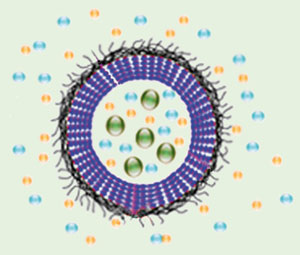Semi-porous hollow nanospheres could improve the delivery of anti-leukaemia drugs in the body claim scientists in China.
L-asparaginase is a very effective anti-tumour enzyme used to treat leukaemia. However, its harmful side effects limit its clinical use. Chemical modification of the enzyme results in a large loss of activity and previous drug delivery systems have been unable to prevent leakage into the blood.
Bang-Jing Li at the Chinese Academy of Sciences, Chengdu, and colleagues have created porous, polymer-based nanocapsules to hold L-asparaginase. The nanospheres are self assembled from biocompatible degradable poly ethylene glycol and cyclodextrin units and contain many cavities that allow high enzyme loading. Their semi-permeable nature prevents the L-asparaginase from leaving while allowing substrates and products to pass through. This maintains the enzyme activity and protects the patient from harmful effects caused by early leakage into the blood.

|
Anti-leukima enzymes can be delivered by porous nanospheres
|
'The advantage is that the enzyme is stable under different conditions because it is protected in the polymer bead shell and the activity seems to be preserved,' says Ljiljana Fruk, an expert in immobilisation of enzymes at the Karlsruhe Institute of Technology, Germany.
Encapsulating large guest molecules such as proteins and enzymes in this way could have many other diverse applications, including catalyst supports, materials for electronic packaging, explains Li. 'We are now exploring these self-assembled hollow spheres in DNA delivery and trans-membrane protein-enzyme bioapplications,' he adds.
Michael Brown